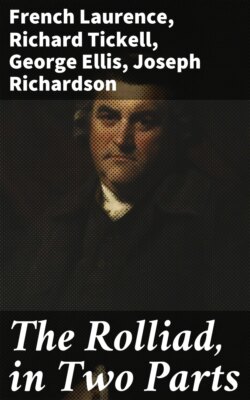Читать книгу The Rolliad, in Two Parts - George Ellis - Страница 9
NUMBER I.
Оглавление“Cedite Romani Scriptores, cedite Græci.”
Nothing can be more consonant to the advice of Horace and Aristotle, than the conduct of our author throughout this Poem. The action is one, entire and great event, being the procreation of a child on the wife of a Saxon Drummer. The Poem opens with a most laboured and masterly description of a storm. ROLLO’s state of mind in this arduous situation is finely painted:
Now ROLLO storms more loudly than the wind,
Now doubts and black despair perplex his mind;
Hopeless to see his vessel safely harbour’d,
He hardly knows his starboard for his larboard!
That a hero in distress should not know his right hand from his left, is most natural and affecting; in other hands, indeed, it would not have appeared sufficiently poetical, but the technical expressions of our author convey the idea in all the blaze of metaphor. The storm at length subsides, and ROLLO is safely landed on the coast of Sussex. His first exploit, like that of Æneas, is deer-stealing. He then sets out in the disguise of a Sussex Smuggler, to obtain intelligence of the country and its inhabitants:
Wrapt in a close great-coat, he plods along;
A seeming Smuggler, to deceive the throng.
This expedient of the Smuggler’s Great-coat, we must acknowledge, is not quite so Epic, as the veil of clouds, with which Minerva in the Odyssey, and Venus, in the Æneid, surround their respective heroes. It is, however, infinitely more natural, and gains in propriety, what it loses in sublimity. Thus disguised, our adventurer arrives at the Country-house of Dame SHIPTON, a lady of exquisite beauty, and first Concubine to the Usurper HAROLD. Her likeness (as we all know) is still preserved at the wax-work in Fleet-Street. To this lady ROLLO discovers himself, and is received by her in the most hospitable manner. At supper, he relates to her, with great modesty, his former actions, and his design of conquering England; in which (charmed with the grace with which he eats and tells stories) she promises to assist him, and they set off together for London. In the third book Dame SHIPTON, or, as the author styles her, SHIPTONIA, proposes a party to the puppet-show; on the walk they are surprised by a shower, and retire under Temple-bar, where Shiptonia forgets her fidelity to Harold. We are sorry to observe, that this incident is not sufficiently poetical; nor does Shiptonia part with her chastity in so solemn a manner as Dido in the Æneid. In the opening of the fourth book, likewise, we think our author inferior to Virgil, whom he exactly copies, and in some places translates; he begins in this manner:
But now (for thus it was decreed above)
SHIPTONIA falls excessively in love;
In every vein, great ROLLO’s eyes and fame
Light up, and then add fuel to the flame!
His words, his beauty, stick within her breast,
Nor do her cares afford her any rest.
Here we think that Virgil’s “hærent infixi pectore vultus verbaque,” is ill translated by the prosaic word stick. We must confess, however, that from the despair and death of Shiptonia, to the battle of Hastings, in which ROLLO kills with his own hand the Saxon Drummer, and carries off his wife, the Poem abounds with beautiful details, cold-blooded matter of facts. Critics may perhaps object that it appears from the Genealogy of the Rollos, Duke ROLLO came to England more than 60 years before the battle of Hastings: though the Poet represents him as the principal hero in that memorable engagement. But such deviations from history are among the common licences of poetry. Thus Virgil, for the sake of a beautiful episode, makes Dido live in the time of Æneas, whereas she lived in reality 200 years before the Trojan war; and if authority more in point be desired, Mr. Cumberland wrote a Tragedy, called the Battle of Hastings, in which there was not a single event, except the death of Harold, that had the slightest foundation in historical facts, or even probability.
But the sixth book, in which ROLLO, almost despairing of success, descends into a Night Cellar to consult the illustrious MERLIN on his future destiny, is a master-piece of elegance. In this book, as the Philosopher’s magic lantern exhibits the characters of all ROLLO’s descendants, and even all those who are to act on the same stage with the Marcellus of the piece, the present illustrious Mr. ROLLE, we mean to select in our next number some of the most striking passages of this inexhaustible Magazine of Poetry!
* * * * *
